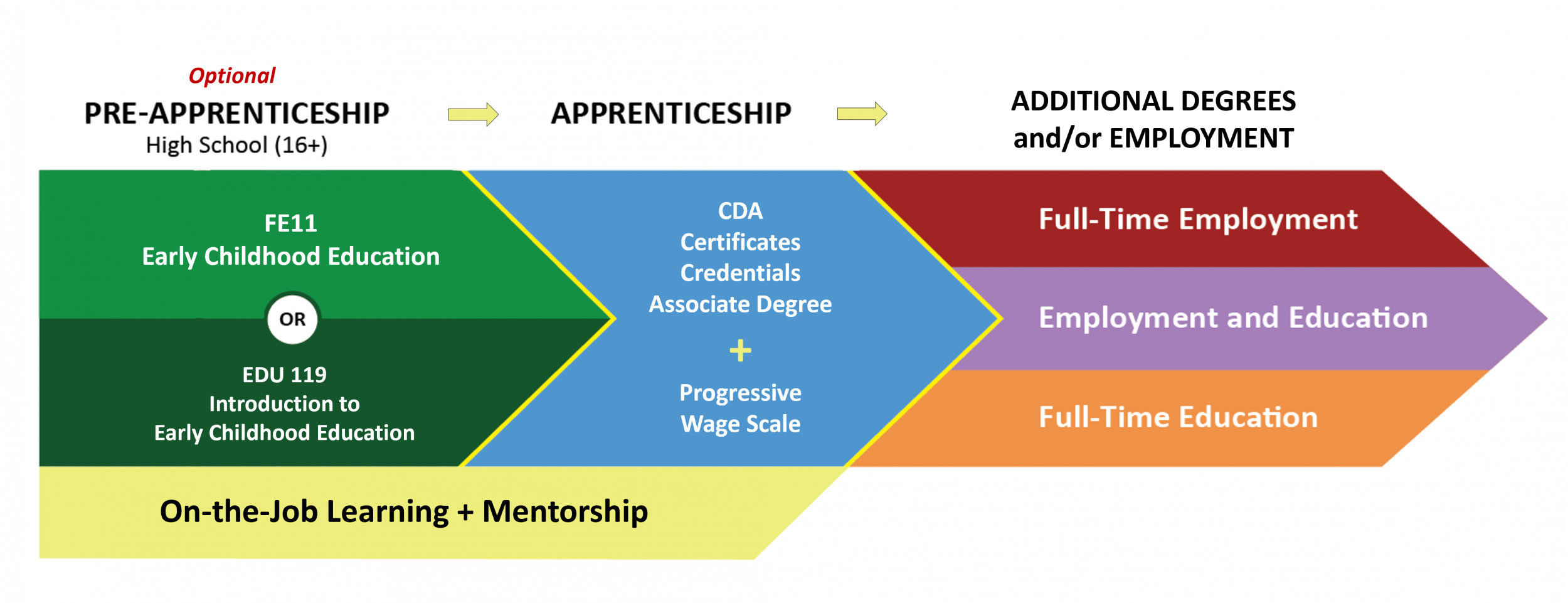Building Bright Futures (BBF) is an initiative designed to support and scale apprenticeships in early childhood education throughout North Carolina. BBF offers technical assistance, financial support, and resources to apprentices, child care centers, school districts, community colleges, and other partners that are part of a registered apprenticeship program through ApprenticeshipNC. Partnering with ECE stakeholders across the state, BBF is helping to build a high quality ECE workforce.
Participants in this initiative have received support for wages, wraparound services, and mentorship, as well as access to a network of industry professionals and enrichment opportunities to advance knowledge in the field.
Learn more about the types of support our program provides to apprenticeship participants in the Our Support section.
Morgan Ford is the Program Director, leading the BBF program's mission to develop, implement, and scale early childhood apprenticeship programs across NC. Since graduating from the University of Virginia with a BA in English, she has had over 30 years of experience working with and managing community outreach and communications projects for public schools, nonprofits, and local, state, and federal government. As a parent, sometimes substitute teacher, and a long-time volunteer in preschools and the public schools, Morgan has a passion for supporting students and educators. When she’s not working, you can find her organizing anything she can get her hands on, eating chocolate, and spending time with her (not so little anymore) kids.
Lindley Hille serves as the Data Manager for Building Bright Futures, where she plays a role in supporting the day-to-day financial and data operations. Lindley grew up in NC and graduated from UNC-Chapel Hill. She lived for a short time in New York City where she worked for the Calhoun School in Development. After moving back to NC, Lindley attended pharmacy school and worked in retail, independent, and hospital pharmacies. She continued to volunteer in her children’s classrooms as well as tutor one-on-one before school to help bring students up to grade level in math. Lindley loves spending time at the beach, reading a good book, playing in the pool with family, cooking something yummy in the kitchen, and walking with friends.
Christina Hutchinson serves as a Data Manager, assisting in the day-to-day financial and data operations. She has a strong background in marketing and organization and loves all things technical. When she is not busy volunteering in her community, you will find Christina at home or on the road, enjoying photography, antiquing, or hanging out with her husband, son, and cat.

With a passion for early childhood education, public education, and building services for vulnerable populations, Marsha supports non-profit and for-profit organizations, counties, and states in addressing their current and future needs. Marsha recently retired as President of Child Care Services Association (CCSA) and previously served as Senior Advisor at the DHHS Administration for Children (ACF), Office of Early Childhood Development, where she coordinated early childhood workforce efforts and homelessness issues. She was involved with early childhood workforce initiatives in the Race to the Top Early Learning Challenge (RTT-ELC) grant in collaboration with the U.S. Department of Education, served as Executive Director of the Early Care & Learning Council in New York, and was Executive Director of Durham’s Partnership for Children, a Smart Start initiative.
Employers who participate in a registered early childhood education (ECE) apprenticeship agreement in NC can join Building Bright Futures (BBF) to receive support for apprenticeship costs, mentorship, and access to a network of industry professionals and enrichment opportunities to advance knowledge in the field. BBF can help your organization connect with apprenticeship partners and resources to put your current and future workforce on the path to a high quality educational and professional experience!
If you are new to apprenticeship, or are just exploring the idea, Building Bright Futures can also help guide you to best resources and organizations to help you get started.
Learn more about BBF's impact, success stories, and lessons learned in its 2025 Playbook: Building Bright Futures: Developing and Scaling Early Childhood Education Registered Pre-Apprenticeships and Apprenticeships in NC
In addition to BBF, NCBCE's NC Career Launch initiative is your go-to for early childhood education high school pre-apprenticeships! Contact Morgan Ford at morgan.ford@nc.gov for more information, or click on the Career Launch icon to go directly to their site.
PRESCHOOL DEVELOPMENT GRANT
2026
More information coming soon!
January 1, 2025-September 29, 2025
On the heels of its successful pilot program in 2023 and 2024, Building Bright Futures continued its support for ECE apprenticeships in 2025, working closely with DCDEE, ApprenticeshipNC, the NC Department of Public Instruction, the NC Community College System, and Early Years to bring more opportunities to increase NC's high quality early childhood workforce.
Our intiative offered support for apprenticeship programs registered with ApprenticeshipNC:
PILOT PROGRAM
January 1, 2023-December 31, 2024
During the pilot program, BBF supported registered ECE pre-apprenticeship and apprenticeship programs, up to the completion of an Associate Degree. Participating in apprenticeship with the support of BBF benefitted employers, apprentices, and mentors alike.
Welcome! Building Bright Futures (BBF) is here to help you support and train NC's future early childhood educators through apprenticeship. Whether you are already part of an apprenticeship program, or are just exploring the idea, BBF can guide you to the right resources and partners. It's time to get started!
1) Learn About Apprenticeship
2) Contact Us
4) Make Connections
5) Join or Create an Apprenticeship Program
6) Explore Other ECE Apprenticeship Resources
While you are considering apprenticeship or working toward participation, keep in touch! We are here for you throughout the process, and we offer several ways for you to stay connected:
Apprenticeships combine paid on-the-job training with classroom instruction to prepare workers for a highly skilled career. Apprentices are at least 16 years old, and can be an incumbent worker, a new hire, or a high school student. Registered apprenticeships are those approved by ApprenticeshipNC, North Carolina’s apprenticeship agency. Read more about apprenticeships and find a community college in your area by visiting ApprenticeshipNC.
We like to have a one-on-one relationships with our participants, so we don't have a quick link to instantly sign up with our program.
Contact Morgan Ford, Program Director, morgan.ford@nc.gov to let us know you are interested. We will walk you through how our program works, and if you are interested, send you information about our enrollment process.
BBF offers both technical assistance and financial support. Enrolling with BBF does not automatically mean you are eligible for our funding, but it does mean you can rely on our support and guidance!
To be eligible for BBF financial support, we require three things:*
For more information on how to sign up with BBF and learn more about apprenticeship, visit Get Started.
There is no cost for enrolling with Building Bright Futures! Building Bright Futures is an initiative designed to provide resources and financial support, thereby reducing costs to those participating in an ECE apprenticeship.
A Sponsor is the organization responsible for administrative oversight of the apprenticeship agreement. Sometimes, the Sponsor and the Employer are the same. For a full list of apprenticeship-related terms, see the BBF Glossary of Terms.
Yes! Building Bright Futures funding can be used along with other funding sources, such as financial aid, scholarships, grants, and other resources. Visit our Funding Resources page for more information.
Early childhood educators not only support the local workforce, but are also invaluable to a child’s first years of life. Children, parents, caregivers, and communities rely on access to quality early child care and high-quality educators to thrive.
Apprenticeships in early childhood education offer a supportive path for receiving a quality education while gaining paid, hands-on experience in an early child care setting. For child care centers, apprenticeships serve as a valuable recruiting and retention tool with access to dedicated workers who are simultaneously gaining the skills and education necessary for career success.
Below is a general overview of how ECE pre-apprenticeships and apprenticeships work. Keep in mind that each program is unique, and some of the information below may not apply in all instances. For more information, visit ApprenticeshipNC.
ECE Apprenticeship Pathway
This image illustrates the main phases of a student's apprenticeship journey, with multiple entry and exit points. You can see that high schoolers have two options for taking an introductory class. Most people will enter at the Apprenticeship level, and the completion of the apprenticeship leads to many options for next steps!

Who Can be an Apprentice?
Apprentices are paid employees. Pre-Apprentices and Apprentices can include anyone who is at least the age of 16. Many employers look first at their current employees. Who is already working and taking classes? Who is interested in pursuing further education, but hasn't had the support to follow through? Employers can also hire Apprentices from outside their organization.
Apprentices can have any level of professional or educational experience. There is an extry and exit point on the ECE Apprenticeship Pathway for everyone! ApprenticeshipNC provides prior credit for some requirements. This allows a range of employees or new hires to enter the same program, but at the level of experience that applies best to them.
The Early Childhood Educator apprenticeship model is successful because of the key elements listed below. Each of these items, however, can be customized to your own program.
Pre-Apprenticeship is an optional pre-cursor to the apprenticeship, designed to prepare the high school student for apprenticeship, or to allow them to explore ECE as a potential career path. It serves as the perfect recruiting and training tool for Employers, while pre-apprentices have the chance to test out a career they are interested in.
BONUS! High schoolers who complete a pre-apprenticeship and register as an apprentice within 120 days of graduation are eligible to receive a tuition waiver at any of the 58 NC community colleges toward the aligned curriculum, reducing costs for both the student and their employer.
VIDEO: McDowell County Schools was one of the first organizations in North Carolina to register pre-apprentices, and an inspiration for creating Building Bright Futures. Learn more about their experiences! December 2021
The field of early childhood education holds opportunities for a number of honorable, impactful, and rewarding careers. Degrees and certificates in early childhood can open many doors to a variety of workplace options.
|
|
|
|
|
|
There are a number of workplace options available to those involved in early childhood education. Each of the following environments depends on childhood development professionals at all levels of expertise. Work environments that are suitable for early childhood educators include:
Helpful Links
Find additional information and inspiration from BBF webinars, in particular:
To explore additional career options for early childhood educators, visit the Early Years' Career Directory.
NCcareers.org aims to be North Carolina’s central online resource for students, parents, educators, job seekers and career counselors looking for high quality job and career information.
Building Bright Futures is an initiative developed by the North Carolina Business Committee for Education (NCBCE), a non-partisan, business-led, education and workforce non-profit (501-c3) that operates out of the Office of the Governor. Since 1983, NCBCE has provided a critical link between North Carolina business leaders and the state’s education decision-makers, helping to create connections between the education curriculum and the overall work readiness of people across the state.
NCBCE received a grant from NC’s Department of Health and Human Services (DHHS) - Division of Child Development and Early Education (DCDEE) to pilot the Building Bright Futures initiative from January 1, 2023 - December 31, 2024.
NCBCE received a grant from DCDEE to continue the Building Bright Futures initiative beginning January 1, 2025 - September 29, 2025.
To learn more about other great work-based learning NCBCE initiatives, visit the NCBCE web site.